For three years I helped lead the charge for improving relations between the US and Russia. Now, with peace at hand, I reflect on the reality that the role of rogue peacemaker may no longer be in vogue.
Last night myself and my friend and fellow independent journalist, Garland Nixon, made our way to the Russian Embassy in Washington, DC, the invited guests of the chargé d'affaires, Alexander Kim, and the Defense Attaché, Colonel (promoted to Major General) Pavel Terkin, to celebrate Defender of the Fatherland Day.
This would be my third consecutive visit to the Russian Embassy to celebrate this auspicious occasion, a day dedicated to those who serve Russia in the armed forces of the Russian Federation. The holiday marks the occasion of the first mass mobilization of citizens into the Red Army held in Moscow and Petrograd in 1918. Celebrated originally as Red Army Day, and later as Soviet Army and Navy Day, the holiday took on its current name in 2002 by Russian President Vladimir Putin, who decreed it to be a State Holiday.
For two decades the Russian people would mark this day with toasts, honoring the memory of those who had served the Fatherland in the past, and those who served it in present times. Whereas May 9 (Victory Day) had captured the imagination of the Russian people, Defender of the Fatherland Day was celebrated in a more muted fashion.
Until the Special Military Operation.
Russia’s initiation of military operations against Ukraine transpired on February 24, 2022–one day after Defender of the Fatherland Day. The Russian nation celebrated their service men and women one day, a nation at peace. And woke up the next day, a nation at war.
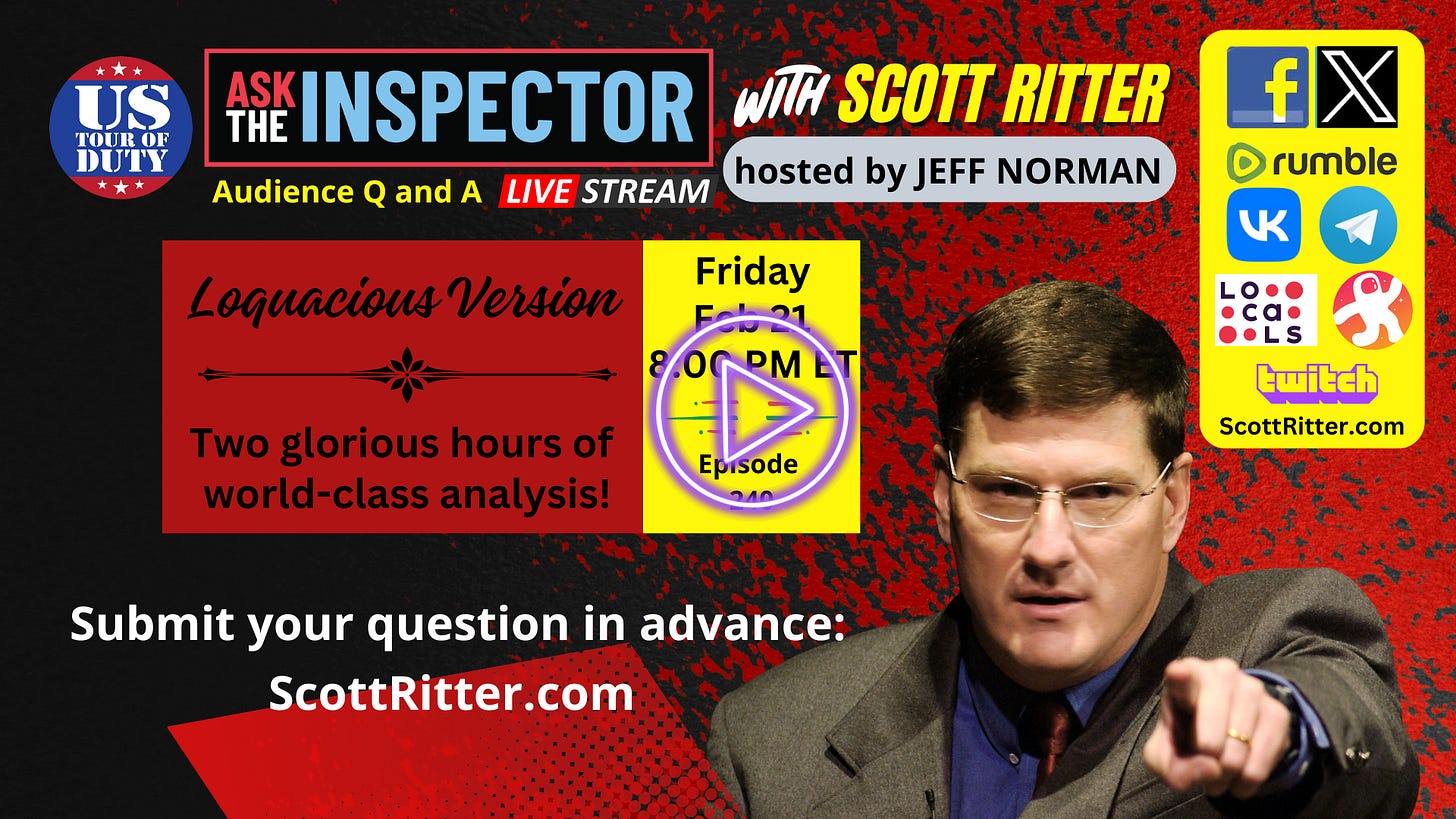
By the time Defender of the Fatherland Day, 2023 rolled around, Russia was a nation isolated from the western world, treated as a pariah state by the United States. Ambassador Anatoly Antonov, one of the Russian Federation’s best experts on the United States, was deliberately cut off from the normal channels of diplomatic interaction, a veritable prisoner in an Embassy that had been conceived in the spirit of détente and consummated in the aftermath of the collapse of the Soviet Union, when US-Russian relations were generally described as “friendly.”
The Russian Defense Attaché, Major General Evgeny Bobkin, had likewise been blackballed by the Defense Attachés’ Association, an association of top international military officers in the US capital whose dean is selected by the US Defense Intelligence Agency, who voted to expel him in March 2022, shortly after the SMO began.
The Defender of the Fatherland celebration is held in the “Golden Hall” of the Ceremonial Building of the Russian Embassy. This grand venue is marked by the elaborate enamel paintings that decorate the side walls of the ballroom. The left wall, as you enter, is comprised of images of the ancient cities that comprise the “Golden Ring” that surrounds Moscow. The right wall contains images depicting the 15 capital cities of the former republics of the Soviet Union.
As told to me by Ambassador Antonov, Russia’s first President, Boris Yeltsin, ordered the paintings covered up, since they depicted a Soviet past he had repudiated. However, on his first visit to the embassy after becoming the President of Russia, Vladimir Putin ordered the room to be restored to its former glory, and the paintings are on full display today for visitors to admire.
The Defender of the Fatherland celebration of 2023 was one defined by a war in Ukraine that had grown into a proxy conflict between the collective West and Russia. The setting could only be described as simultaneously patriotic and defiant, with my Russian hosts going out of their way to make a linkage between the Ukrainian conflict and the war against Nazi Germany.
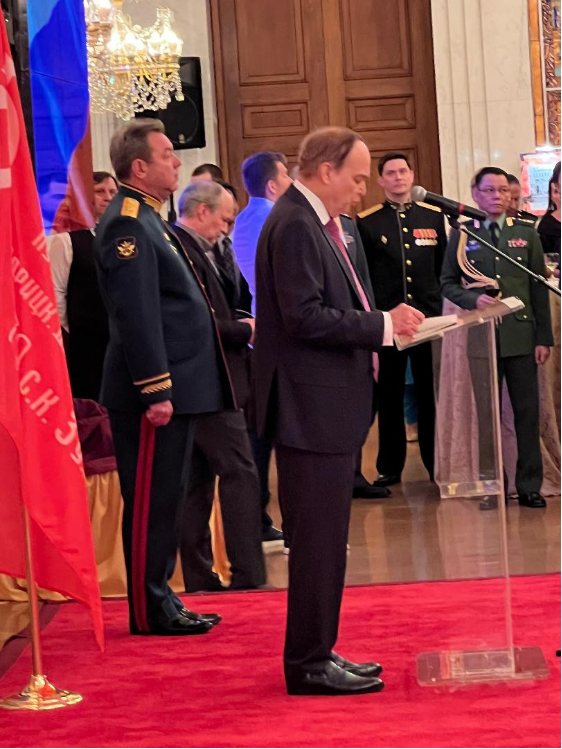
Anatoly Antonov’s speech was diplomatically defiant, chastising the US and its European allies for forgoing the bonds of the alliance that had defeated Nazi Germany in favor of supporting the modern-day successors of Nazi Germany—Banderist Ukraine—against their former Russian ally and friend.
The Defender of the Fatherland Day celebration was supposed to be a grand affair, attended by the diplomatic elite of Washington, DC society. But on this occasion the “Golden Hall” was only half-full. While the friends of Russia from the so-called “Global South” were in attendance, there were no official representatives from either the US or Europe present.
I joined a handful of stalwart Russian-American citizens who braved the scrutiny of the FBI to make entrance into a compound that had, for all sense and purpose, become enemy territory from the perspective of the United States.
I was very much a fish out of water, a stranger to the surroundings, proceedings, and personalities. Sensing my isolation, I was taken under the wings of a cadre of Russian officers led by Colonel Semen Volkov, a paratrooper who introduced me to his fellow officers of the Russian Defense Attaché office. My Russian being what it was, and Colonel Volkov’s English being only marginally better, the evening devolved into an exchange of short military-themed anecdotes punctuated regularly by toasts to the glory of the Russian soldier/sailor/airman/Marine.
The culminating moment came with the final toast of the night, which I had recorded as a video. When the celebration ended, and I bid farewell to my hosts and new friends, I posted this video on my social media. The firestorm it generated in terms of those who liked it and those who condemned it served as the perfect illustration of the controversy that is attached to anyone promoting peace in a time of war.
By the time Defender of the Fatherland 2024 rolled around, my profile as an erstwhile peacemaker had grown exponentially. My profile had exploded at home and abroad, and I had two high-profile trips to Russia under my belt, including one which saw me address 25,000 Chechen soldiers and visit the territories of Crimea and New Russia.
I came prepared, bringing a bottle of bourbon for Colonel Volkov and his comrades. Armed with recent experiences and insights, my ability to interface in a more comprehensive way with my hosts made this evening one to remember. The sense of patriotism and defiance still existed, but my Russian hosts were buoyed by the success of their nation in withstanding the military, economic, and diplomatic onslaught at the hands of the collective west. I was still an American operating in near total isolation from my fellow countrymen, who were still absent from the ceremony. But the cause of peace resonated even stronger this year, and the overall mood in the “Golden Hall” was one of prideful optimism.
Before departing, I gathered Colonel Volkov and his comrades together to record our final toast.
Once again the responses on social media were either intensely supportive or damning.
During the celebration I was approached by General Bobkin, who extended an invitation for me to attend the Moscow International Security Conference in August. I was already scheduled to attend the Saint Petersburg International Economic Forum in June, and the BRICS summit in Kazan in October. The Moscow International Security Conference gave me entree to the three most prestigious forums regarding Russia and the world. I was excited for the approach of summer and the unique opportunities that would unfold.
Unfortunately, none of this was meant to be. The US Department of State seized my passport as I was preparing to board my flight to Saint Petersburg, and in August the FBI raided my home, alleging that I was working as an unregistered agent of Russia.
There was a price to be paid for advocating peace in a time of war. The Russian government seemed at a loss when it came to me. They more than anyone knew I was not their “agent,” and yet to say anything would, from their perspective, only make things worse for me. I was invited to receptions—Russia Day in June, and a piano concert in September—but the atmosphere was markedly different. There was hesitation on the part of the diplomats where once there was a sense of common purpose.
The exception to this hesitancy was the officers of the Defense Attaché’s office. Major General Bobkin, until his departure in the summer of 2024, and his replacement, Colonel Terkin, were as friendly and receptive as ever, and Colonel Volkov and his comrades were my constant companions. We talked about military service, the war in Ukraine, and the prospects for peace. But we talked as friends, a completely different plane to that of professional colleagues.
The election of Donald Trump, and the dramatic progress being made in terms restoring a sense of normalcy to relations between the US and Russia, created a whole new tone and atmosphere surrounding the Defender of the Fatherland 2025.
In 2023 and 2024, when I entered the grounds of the Russian Embassy, there were a few diplomatic vehicles dropping off guests, and a short line of people waiting at the security checkpoint. 2025 saw Garland and I wait in a line for nearly 30 minutes to be cleared into the embassy grounds, and the ceremonial hall was packed with attendees. There were still no representatives from either the US or Europe, but as Bob Dylan famously noted, the times were indeed a’changing.
There was a positive vibe which infused the evening, even though Russia had not sent an ambassador to replace Anatoly Antonov when he returned home last fall.
The recently concluded talks between Secretary of State Marco Rubio and Foreign Minister Sergei Lavrov in Riyadh, backed by a positive 90-minute phone call between President Trump and President Putin, brought with it a sense of cautious optimism. The Russian Embassy staff had, since 2016, been whittled down by more than 400 persons. Life for Russian embassy employees and their families had become extremely difficult—restrictions on travel were suffocating and demoralizing, and the inability to function as their posting intended had brought with it a loss of purpose.
The prospect of seeing the embassy brought back to full strength and cleared to engage with the US government in the full range of diplomatic duties and responsibilities was a discernible morale booster.
There was work to be done, and there was much that remained uncertain.
But peace, not war, infused the festivities.
I watched the evening’s events with a sense of joyful sadness.
We had come so far from that first fretful evening two years ago.
It had not been an easy path for anyone.
The Colonels and I had served as rogue peacemakers, working outside normal channels to build a common purpose founded on our mutual sense of duty to our respective nations.
I watched as the representatives of nations that had previously been subdued now openly celebrated with their Russian hosts.
Diplomatic norms were returning.
The age of the rogue peacemakers was past.
If things progressed along the trajectory they were currently on, next year the “Golden Hall” would be filled with American diplomats and officers, engaged in the critically important task of restoring and sustaining relations with the Russian Federation.
And I and the others who had braved adversity to help create the conditions for this very opportunity would be relegated to footnote status.
Which was ok.
But sad in a way.
I had brought with me a bottle of bourbon—Colonel E. H. Taylor “Small Batch”—for Colonel Volkov and the other officers of the Russian Defense Attaché office (I had bequeathed a bottle of Weller’s Special Edition to Colonel Terkin.)
My Russian hosts had prepared a special gift for me as well—a bottle of “Kuz’kina Mat” (“Kuzma’s Mother”) contained in a metal vessel that was a scale model of the 50-megaton Tsar Bomba, the largest nuclear weapon ever tested.
“Kuzma’s Mother” was a nickname given to the Tsar Bomba by Russians in the know. The reference to “Kuzma’s Mother” relates to an angry outburst by Nikita Khrushchev on June 24, 1959, when he told Vice President Richard Nixon, during a visit to Moscow, “I’ll show you Kuzma’s Mother!”
Interpreters were at a loss as to how to interpret this phrase to Nixon, who was left wondering who this Kuzma was, and what his mother looked like.
But the reality is that “to show Kuzma’s Mother” was a Russian idiom for “I’m going to show you,” a threat.
And what Khrushchev was threatening to show Nixon and the world was the Tsar Bomba.
What Colonel Terkin presented me with was an extremely rare bottle of “Thermonuclear Vodka.”
“This vodka is not to be drunk lightly,” Colonel Terkin told me, the seriousness in his voice evident. “This is a special gift to someone who knows both war and peace. Save this bottle for the most special of occasions, something that is of such magnitude that you feel compelled, as Khrushchev did, to pound the table and tell them you’re going to show them ‘Kuzma’s Mother’!”
Duly chastened, I took the time to admire this gift and reflect on the magnitude of the moment.
Colonel Terkin and I had just finished a lengthy conversation about what life would be like for he and his men once things got back to normal. They had a job to do, a job that required them to coordinate with their American military counterparts on issues deemed important by the Russian Ministry of Defense.
The days of spending extensive time with a rogue American peacemaker were over.
But this did not mean that there was no longer a role for this rogue.
What Colonel Terkin was telling me is that I would need to go find a task worthy of standing before the world and telling them, “I’ll show you Kuzma’s Mother!”
“This bottle is shaped like a nuclear bomb,” Colonel Terkin said. “Maybe its contents can be drunk when there are no more nuclear bombs in the world.”
The Defender of the Fatherland Day celebration was scheduled to run from 6 pm until 8 pm. By the time Colonel Terkin and Colonel Volkov had presented me with the bottle of “Kuzma’s Mother,” it was already well past 8 pm. Colonel Volkov ushered me over to a table where Russian and Kazakh officers had gathered. The bond between the two nations was unmistaken as toasts were made and shot glasses of vodka discharged.
I gathered Colonel Volkov and his comrades together for one last toast, which per tradition I filmed and posted on social media.
It was time to go.
Colonel Volkov mustered everyone who remained—the officers, their wives, and their guests—for one last toast, which ended in the traditional recitations of “Urrah, Urrah, Urrah!”
I found Garland, and we bid our hosts farewell.
As we left the Ceremonial Building of the Russian Embassy, the sounds of the last “Urrah” still echoed in my ears.
These were good people, I thought.
The best.
I had become somewhat melancholy during the evening, confronting the evidence of my soon-to-be obsolescence.
But I felt the heft of the box containing “Kuzma’s Mother” in my hand.
I wasn’t obsolete.
Peace could never be obsolete.
I’m going to show you all “Kuzma’s Mother!”



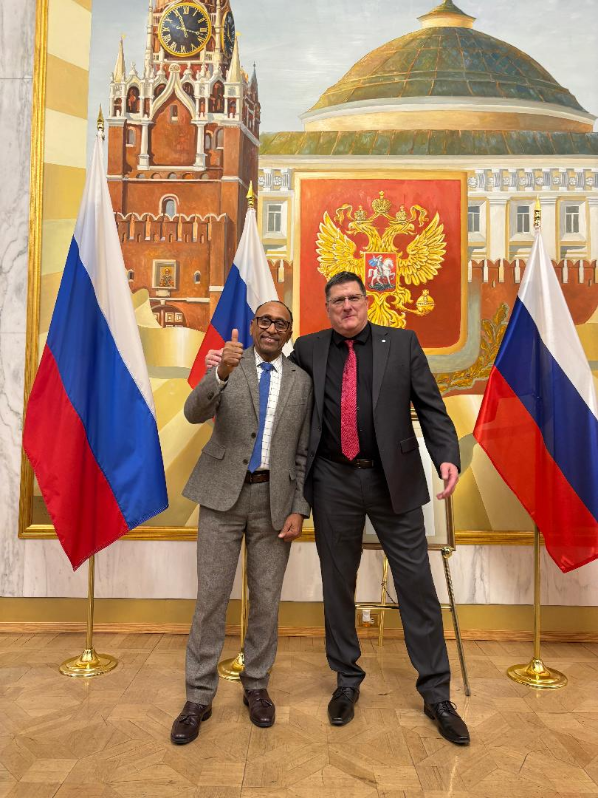
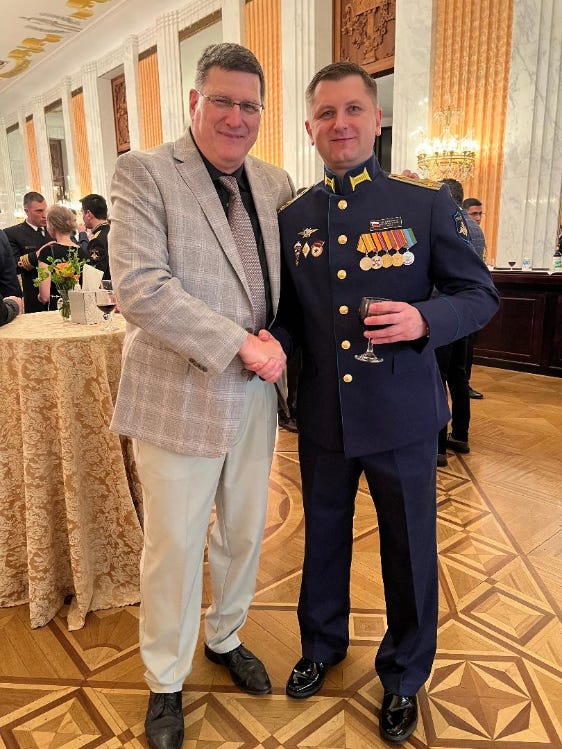
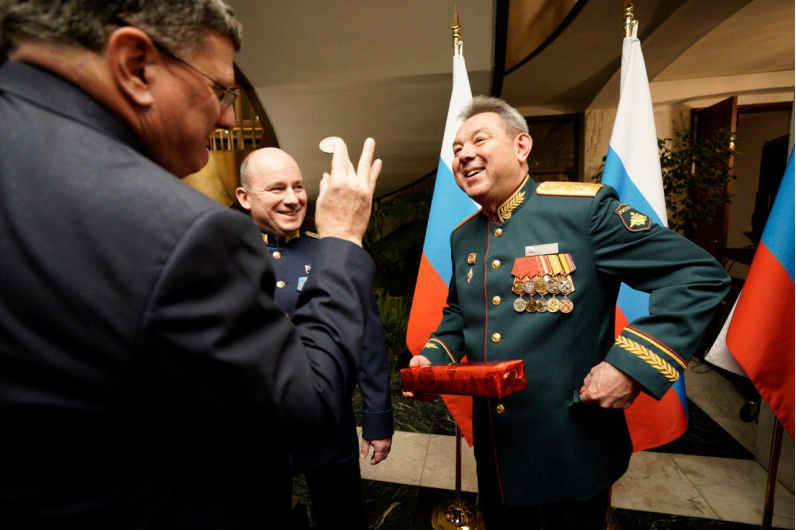
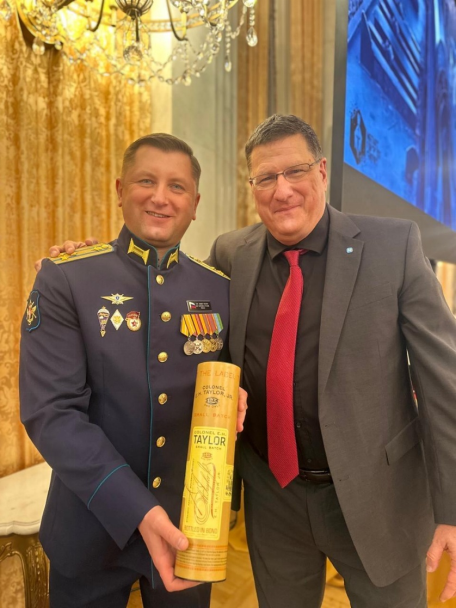
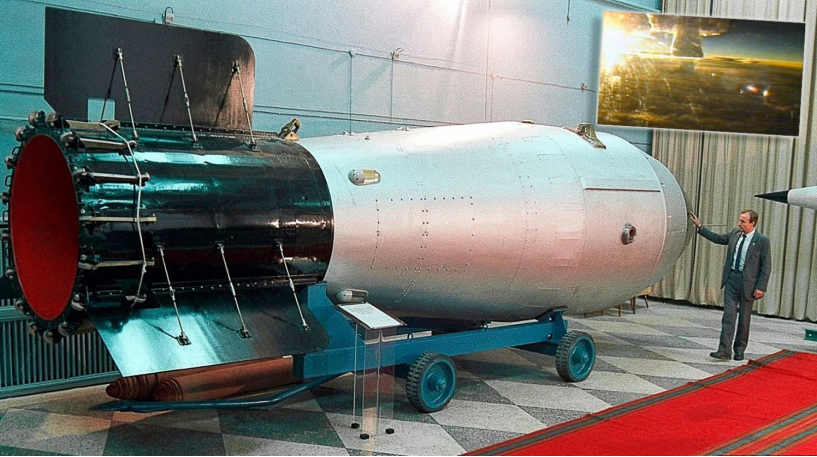
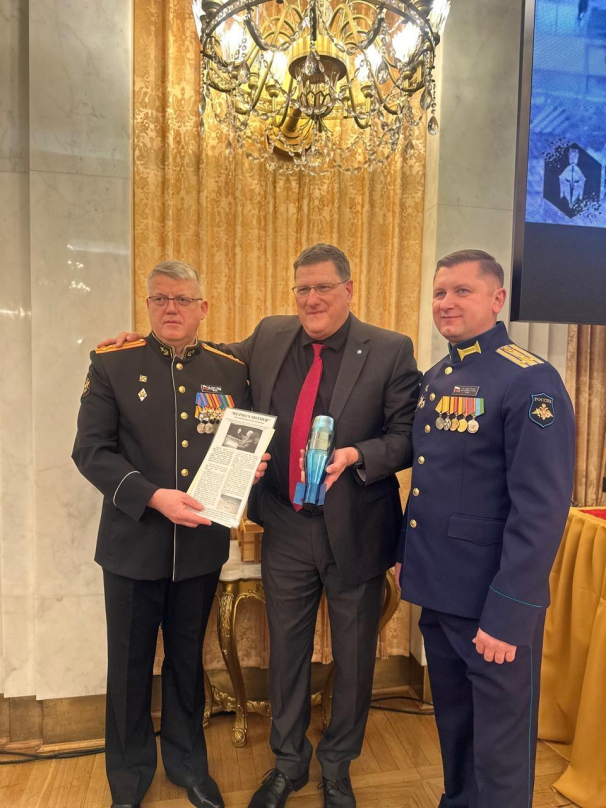
Yes, well, it is ironic that, if you succeed in your goal of achieving peace, you will become less relevant. However, something tells me that the world will remain in need of decent, truthful analysis ... and that the world has not heard the last of Mr Scott Ritter ...
Scott, outstanding article. It feels like I was in room with you myself drinking those shots of vodka. You are great man and warrior for peace and hence there will be always a need for man like you in our world. God bless you.